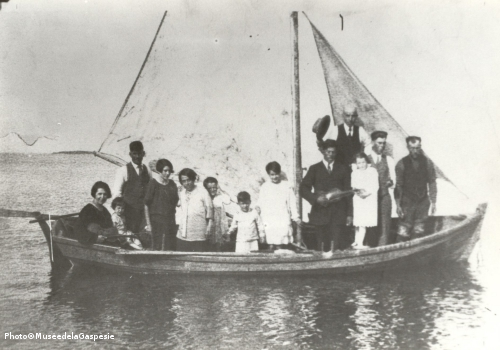
J’ai chanté sur tous les tons sur les filles et les garcons Des carottes pis des navots Ah! Venez voir comme ils sont beaux De l’ouvrage aux Canadiens et à la grocerie du coin. ˝ From Les policemen, recorded on May 5, 1932 Madame Bolduc had more than one string in her bow: she wrote songs, recorded albums, appeared on CKAC radio station and performed in a series of shows. In 1930, after achieving success with La cuisinière (The Cook), she signed a contract with Starr Record to produce 12 records per year which meant she had to write two songs a month. Her humorous lyrics told the tale of everyday life or chronicled current events. For her tunes, she found her inspiration in folk music, adding her signature mouth music here and there.
Inspired by her fragrant jams, Madame Édouard Bolduc composed La Cuisinière, with its funny lyrics and lively score, at her kitchen table. On December 6, 1929, she recorded this first original song, quite different from the contemporary repertoire. For the B side, she recorded a French adaptation of an Irish song, L’habit de Johnny McFellow. The record was a resounding success.
Madame Édouard Bolduc « La cuisinière »/« Johnny Monfarleau » Starr 15665, 1929, 78 tours, Musée de la Gaspésie


« Ça va venir pis ça va venir, Mais découragez-vous pas. Moé, j’ai toujours le cœur gai Et je continue à turluter. » « Ça va venir découragez-vous pas », enregistrée le 23 septembre 1930. Nouvelle grande vedette des disques Starr et de la radio, Madame Édouard Bolduc accepte l’invitation d’aller chanter au grand bal masqué de Lachute, le 25 novembre 1930. Elle y présente son premier spectacle solo. « Vêtue de sa longue robe noire qu’elle a taillée elle-même et qui deviendra son costume de scène, Mary se présente devant une foule en délire qui l’acclame dès qu’elle entre sur scène. Accompagnée d’une pianiste, elle chante, complètement dépassée par la réaction d’une salle qui connaît toutes les paroles, reprend les refrains, turlute avec elle, commente de bravos, de sifflements et lui accorde une longue ovation à la fin. » (David Lenorgan, p. 83)
Affiche publicitaire Encre sur papier 104,6 x 37,6 cm, P11/4/b/1, Musée de la Gaspésie,“Je m’habille modestement Pis mes chansons sont de l’ancien temps, Mais partout j’vas turluter J’ai pas honte de m’présenter.” From La Chanson du bavard (The Chatterbox), recorded on April 9, 1931 When the market for records collapsed in the summer of 1932, public performances made up for the loss. The shows combined vaudeville and song. The highlight of the evening was Madame Édouard Bolduc’s musical performance. She would sing her most popular recorded hits to satisfy her fans, songs inspired by French and Québec folklore and new material that had never been recorded.


“ Partout dans le Canada Quand on veut boir’ un verr’ Comm’ « laBatt » il n’en est pas C’est la meilleur des bières En hiver comm’en été Elle sait vous mettre’en gaieté.” Madame Bolduc composed the jingle La reine des bières (Queen of Beers) for the John Labatt Ltd. The song was printed in Christmas greeting cards signed by H. O. Tremblay of Rouyn, who distributed John Labatt Ltd. products.

These photos are the property of the Musée de la Gaspésie and are governed by a Creative Commons Attribution Licence – No commercial use – No modifications (CC BY-NC-ND 4.0); (CC BY-NC-ND 4.0) the following rules apply:
1. No commercial use of the Works, in whole or in part, is authorised.
2. Any modified Works may not be distributed or made available.
3. Users must credit the Works, add a link to the licence and indicate by all reasonable means, without suggesting in any way that the Licence holder endorses them or the way in which they have used its Works
If you have any questions, please contact us at418 368-1534 ext. 110.

